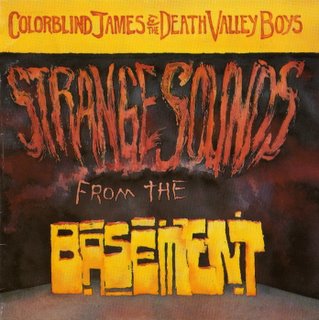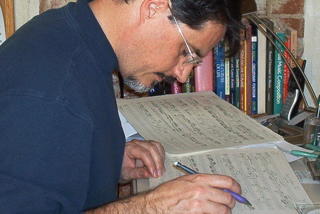"Strange Sounds," Indeed...

After we got home from the tour of '89 (see previous posting), we all spent Christmas with our families and didn't speak to one another too much. We were physically and emotionally exhausted, and, I'd say, just plain tired of one another. I personally had no idea what would happen next. For all I knew, we were finished as a band. The $20,000 debt loomed, and I figured that we'd just spend the next year or two applying most of our gig income towards paying it off.
Somewhere around New Year's Day, 1990, I got a call from Ken, who told me that a deal had been arranged by Chuck to give Cooking Vinyl, our label in England, a new acoustic album, in return for debt payoff. This was fantastic news. We had wanted to record as the Death Valley Boys for a while, and this was a tremendous opportunity. On the '89 tour we had attempted to record a live acoustic album at one of our London shows, but it was pretty much a disaster. We were off our stride musically, we tried to pull too many new songs together at the last minute, and it was for me personally, one of the worst nights of my life as a musician. I felt like I was playing my clarinet with mittens. Even worse, the attempted recording sounded horrible, to the extent that our soundman Carl's board tape on cassette was far better than the "professional" one. The suits at Cooking Vinyl were somehow pleased with this sonic catastrophe, and would have released it, but Chuck said no, we'd record a new album instead. We made plans to record in February of 1990, at Gary Holt's studio in Mount Morris NY. We had recorded 'Why Should I Stand Up?' there, we liked the studio, and Gary was an excellent engineer and musician himself.
One of the unusual aspects of this particular album is that the horns were recorded entirely separately from the rest of the tracks. In fact, Joe and I never saw Phil, Jimmy or Ken in the studio even once on this session. Joe worked out the bulk of the horn arrangements on his piano at home, and he and I put them together in the studio. I play clarinet exclusively on this album, and Joe expanded his range of trombone colors by using a different mute on nearly every track. Chuck attended all of these sessions to approve the arrangements and our playing, but mostly he was astonished at the brilliance of Joe's parts, which were elegant and tasteful, and complemented the songs perfectly, without getting in the way of anyone else's tracks. I think that we were able to do this because we understood one another's playing extremely well by then, and had reached a higher level of musicianship from all of the touring. We were scary tight.
We recorded this album in about a month, working on it on nights and weekends, for a sum of (I think) around $2500. (This is probably what other bands would spend on pizza and beer in the same amount of time...) When it was done, I think we all felt a satisfaction that we'd done something truly unique. Scott Regan responded with what is IMHO our finest, most beautiful album cover. If there is a CbJE masterpiece, for me this is it. I would not presume to speak for the other band members, but this, in my opinion, is CbJE's most consistent, coherent and sophisticated album ever. Every track is worthy, contributing mightily to the sum. The recording quality is superb, in spite of the modest means, and we were all in peak form as musicians.
There are many fantastic moments, but I'll mention a few of my favorites: Phil's amazing double-tracked mandolin solo on "Don't Be So Hard on Yourself," his slide guitar on "Colorblind's Night Out," the lush sound on "O Sylvia," the three-minute miracle that is "Two-Headed Girl," and the lazy, loping ease that we have on the title track. The collective timekeeping of Chuck, Ken and Jimmy achieves a transcendental perfection. Joe's horn arrangements glow throughout, and the band's total musicianship is both astonishing and artfully concealed all at once. I'll make further comments on the songs themselves in a future posting.
And how was this masterpiece greeted by our record company? With bafflement, irritation and overall dis-interest. The album was never even released in the USA. Cooking Vinyl pressed up 2500 copies (LP, cassette and CD, in total) and did nothing discernable to promote it. When the first pressing sold out, there was no discussion of doing more. I never read a single review of this album, positive, negative or in between. The bitter irony for us was that we'd delivered a truly wonderful album, instead of the dreadful live thing that they originally wanted to issue. That our record company failed to see the difference in quality made this all the more painful. I always thought that the album would find an audience eventually, but I'd say the odds are pretty long at this point. Still, it's a recording that when I pull it out and play it, I feel pretty damn lucky to have been a part of it.


5 Comments:
Nice Blog, Dave.
I have to agree that Strange Sounds is a minor masterpiece. The recording quality/production really impresses me. It sounds like it was done in a much bigger studio. And considering the financial woes and general stress the band was under at the time, it has a relaxed feel to it that makes it all the more inviting.
Cooking Vinyl lucked out with the Michelle Shocked Campfire Tapes, which for some reason sold like mad. Otherwise they probably would not have been able to afford us. They always struck me as more car salesman/real estate agents than music people.
Part of the promotion problems for the album was our refusal to use stereotypical "Western" stage names like "Tex" and "Slim." That was the extent of Cooking Vinyl's imagination. After that, they seemed flabbergasted at how to market it.
So, who was supposed to be "Tex?" Not me, that's for sure. "Slim" I guess would have had to go to Jimmy... I'll have some other thoughts on the reasons for the albums apparent incomprehensibility in a posting soon.
And yes, the relaxed feel that pervades the album is one of its greatest strengths, and I've wondered myself how we achieved that. Our circumstances should have produced a much more angst-laden product. Maybe the studio felt like a bit of a refuge from everything at that point.
Strange Sounds was a peak for us and probably the most focused album we put out. Unfortunately the recording of the song "Strange Sounds" found Chuck and I locking horns once again, as we had several times in the past.
During an evening of recording guitar parts, mostly dobro, I put down what I thought was a completely magical slide solo over "Strange Sounds". Gary Holt knew I had hit it and my heart was beating fast and hard, like I'd just delivered the goods. I knew immediately from Chuck's expression that he was going to nix it. I had played some descending half-step slides into chords and Chuck maintained that they sounded "too Spanish". There was no changing his mind. That was Chuck. Once he got it in his head that something was "too Spanish" then, by God, it was too Spanish. I had to re-record it.
What we wound up with I thought was acceptable and Chuck praised as being perfect. It's still difficult for me to listen to the song today without lamenting the "one that got away".
Phil, I am actually working on a new posting that refers to another one of your solos "that got away," though I didn't know about the one on "Strange Sounds," as we were never in the studio together on this album. I absolutely love the solo that exists, but I'd sure like to have heard the other one too.
I faced that obstinate side of Chuck a couple of times, myself, though not to the extent that you had to deal with it. The big one for me was not over a solo, but my soprano saxophone. After I bought that horn, which was easily the best saxophone that I ever owned, I wanted to retire the clarinet from Experience shows, mainly because it was a pain to mic and I always had problems balancing with the guitars. The soprano projected a whole lot better, and (thought I) was a better fit with Joe's trombone on most tunes. Chuck wouldn't even consider this, letting me know that I had been admitted into the band on the basis of the clarinet, and that it would stay. So I kept dragging the clarinet to gigs, but refused to give up on the soprano. It was certainly the right horn to use on "Gospel Mood" and "Death Fears No Man," and I personally think it was a good substitute for the organ solo in "Rockin' as Fast As I Can."
I seem to recall a similar bit of friction over Ken's fretless bass, but I'd better let Ken tell that tale...
Just a casual user, but I agree as a fan and having seen you guys everywhere in Rochester during this period and before. Strange Sounds is my personal favorite - I have every Album (on mp3), I miss Chuck's quirky yet profound songwriting and the bands amazing musicianship.
From seeing you as an acoustic jug band at the Park ave fest street corner or as an electric incarnation at the state street comedy club - I was never disappointed!
Chris
Post a Comment
<< Home